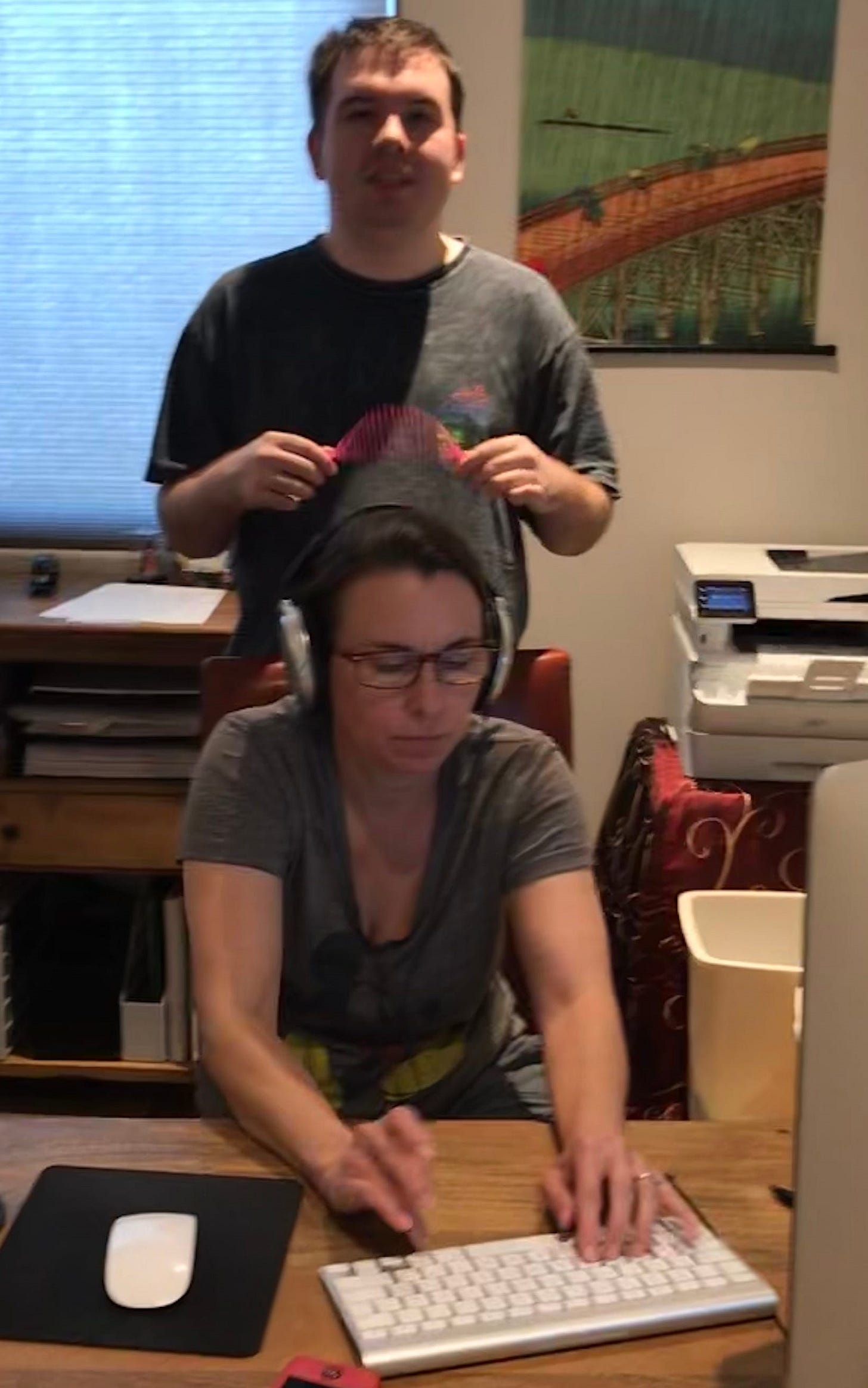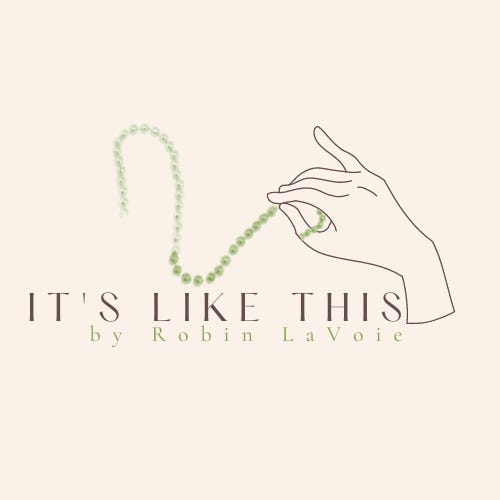"creativity happens not just alongside but within the duties of motherhood"
a good creatures interview with writer Robin LaVoie on parenting a child with nonverbal autism, seeing caregiving and creativity as intertwined, and claiming space for creative practice
Hello there! This is an entry in a new section, good creatures, that explores the intersection of caregiving and creative practice. I’m so excited to showcase people doing lots of kinds of caregiving—people caring for kids or pets or other family members and/or caring for space through gardening or community work or activism—and lots of kinds of creative work.
If you know (or are!) a good creature whose work we should feature, send me an email—you can just reply to this newsletter.
Today’s interview is with writer Robin LaVoie, who reached out to me when I started this series to tell me about how caring for her son, who was diagnosed with autism at 3 and now, at 24, requires 24/7 caregiving, has brought her into writing. “Being a caregiver certainly interrupts creative work in all sorts of ways,” she told me “but I also experience a lot of positive synergy between my caregiving and creative life.” If these are issues that matter to you, you can read more in Robin’s newsletter, It’s Like This, which includes “creative writing and reflections about life as the caregiver, advocate, mom and ally of an autistic young adult.”
Who do you care for?
I care for my son, who is a young adult on the non-verbal side of the autism spectrum. It’s a full-time gig as his driver, shopper, chef, financial planner, patient advocate, hairdresser, emotional support person, educator, and alarm clock (to name just a few). My husband and I designed our home with an attached apartment for our son, so that we could provide the 24/7 supervision and support he needs, while giving us all a bit more space. I’d say I care for my house and plants, too, but my efforts there are hit and miss.
What kind of creative work do you do?
I write personal essays and reflections about life as my son’s caregiver, and share them with anyone who is curious about what life is like over here on my Substack newsletter, It’s Like This.
What’s changed in your creative life since becoming a caregiver?
When I became a parent, 24 years ago, I was working in theatre—directing, stage managing, and producing at a local level. I returned to school for my master’s in history when my child was just 6 weeks old, hoping to develop research skills to support the creation of performances based on people’s true stories. My son’s autism diagnosis came while I was still in grad school, and although I finished, my creative life shifted as I got my footing in this special needs reality. The time, energy, and financial considerations of theatre work became difficult to balance with my parenting responsibilities.
Lucky for me, I was offered an incredible opportunity to work for an author who wanted research support for her first non-fiction book (Susan Southard, author of Nagasaki: Life After Nuclear War). Working with Susan was like taking a master class in narrative non-fiction, from conceptualization through publication, and it opened a new avenue in my creative life—one that I could pursue in the spaces between, and from home (a necessity due to my caregiving role). I began writing on a personal blog, had a few pieces published, and moved over to Substack in 2021.
My writing and my caregiving life have grown together—I am learning how to be a better writer as I figure out how to be a lifelong caregiver for my son.
What are some ways care-giving fosters creativity and vice versa?
My creative and caregiving lives are very intertwined. I turned to writing to tell a few good stories and to explain to myself and others what was happening in this world that I never expected to be dropped into.
Being my son’s caregiver has made me a better observer of life. Due to the nature of his non-verbal disability, I have to slow down, stay quiet, and remain open to unique ways of interacting and communicating. This mode, when I can sustain it, is the best way to support my son. It also happens to be pretty essential to creativity.
My writing, in turn, gives me a break from my sometimes heavy responsibilities and helps me step back into the caregiving role with a clearer mind.
I once heard George Saunders, on Cheryl Strayed’s podcast, say: “It’s good for the world for a writer to bear witness, and it’s good for the writer too, especially if she can bear witness with love and humor and, despite it all, some fondness for the world, just as it is manifesting – warts and all.”
George was talking about writing through the uncertainty and anxiety in the early days of the pandemic, but I felt these words as an affirmation of both my creative and caregiving work. My ability to “bear witness,” with fondness and gentleness, is important: paying attention to this life as it is without piling on judgments and what if’s helps me to be a reliable caregiver for my son, no matter the weather; and, this honest witnessing can reveal a tiny slice of the human experience that (I believe) is good for the world to see and understand. That’s what I try for.
What do you do to help activate the switch (if it is a switch) between creative-brain and care-giving brain? (Is it possible to switch?)
I’ve come to appreciate caregiving itself as a creative act, so those two brains, for me, are very much linked. It takes a lot of creativity to teach my son, to communicate with him, manage his services, push for his independence while monitoring his safety, to advocate, modify, and interpret. I don’t think I could be an effective caregiver if my “creative” brain was not also activated!
When I remember this—that creativity happens not just alongside but within the duties of motherhood—I feel less scattered and split.
You know how writers sometimes say that they love “having written” but that the process of writing can be torturous? Same goes for caregiving. There’s no denying that the day-to-day in caregiving can be quite challenging. But there are moments (hopefully!) when you step back and see the results and feel good about the work you’ve done in support of this person. And, perhaps, this can give you a boost of confidence that you are moving somewhere in your other creative efforts, too.
How do you balance creative practice with care-giving?
I finally have my own dedicated home office, after years of sharing space, and I’ve cultivated a new attitude that I deserve to take this creative time for myself. I’ve trained myself to get up early before the rest of my household, and I adore those quiet few hours. I meditate, close out emails and tabs, set timers, and give myself a lot of grace on those days when the demands of caregiving seep into the spaces that are supposed to be “mine.”
It helps, I think, that my time with my son or my work on his behalf is often the material for my creative practice, so my writer/editor brain is still clicking even if time alone at my desk is scarce. I also take on the “begin again” mantra I’ve heard in meditation practice, remembering that tomorrow, or the next day, or the next, I will have another chance to find that balance.
Robin LaVoie lives with her husband and son in the suburbs of Phoenix. Her son is an autistic young adult, and Robin shares her reflections about life as his mom and caregiver at It’s Like This on Substack. Her writing has appeared in Monday Coffee & Other Stories of Mothering Children with Special Needs (INwords Press, 2013), as well as Pentimento Magazine, Sammiches and Psych Meds, The Sensory Spectrum, NonBinary Review, and most recently BarBar Literary Magazine.
Write More, Be Less Careful is a newsletter about why writing is hard & how to do it anyway. You can find my books here and read other recent writing here. If you’d like occasional dog photos, glimpses of my walks around town, and writing process snapshots, find me on instagram.
If Write More has helped you in your creative life, I’d love it if you would share it with a friend.








I absolutely needed to read this today. As someone who writes but does not necessarily yet think of herself as a writer, I have been consumed with worry over the care of my two adult sons who require full guardianship. To be clear... it is not the care that is overwhelming, but the "worry" of their future care. Robin Lavoie has about 6 years ahead of me (but notably has 1 child with ASD while I have 2) but she shows how it can be done. I read her struggles as my struggles, and this makes me feel less alone and gives me some hope.
Great interview.
I’ve been reading Robin’s work for a little while and it is always wonderfully written, endlessly thought-provoking, and ladden with a touching level of care for her son.